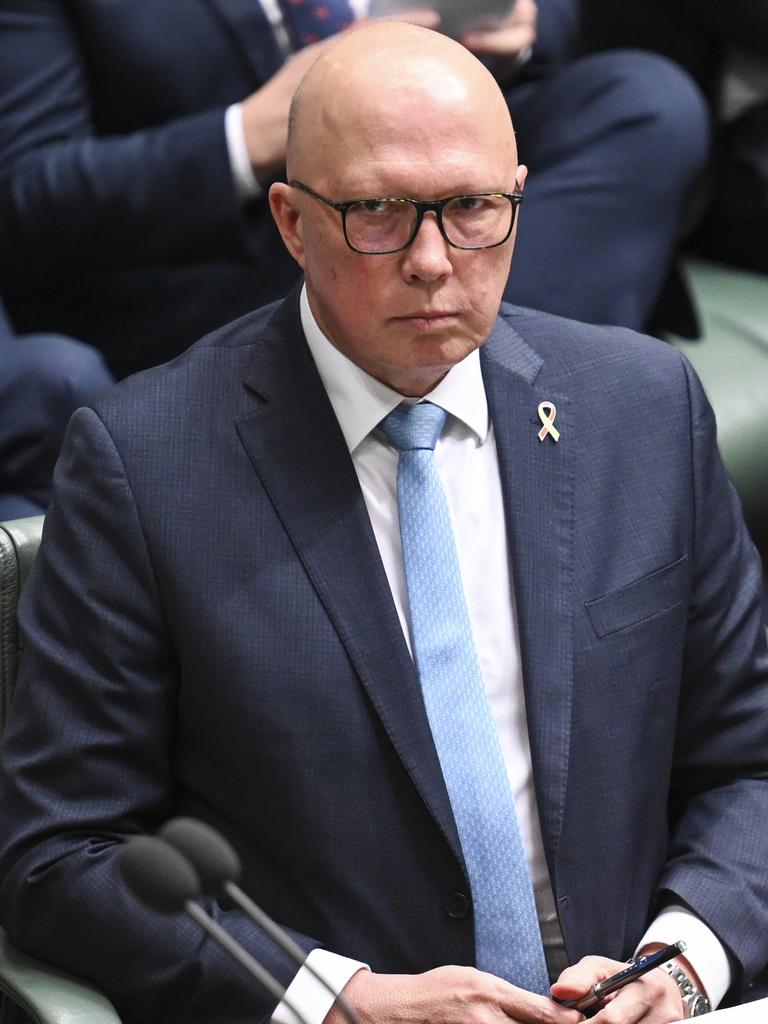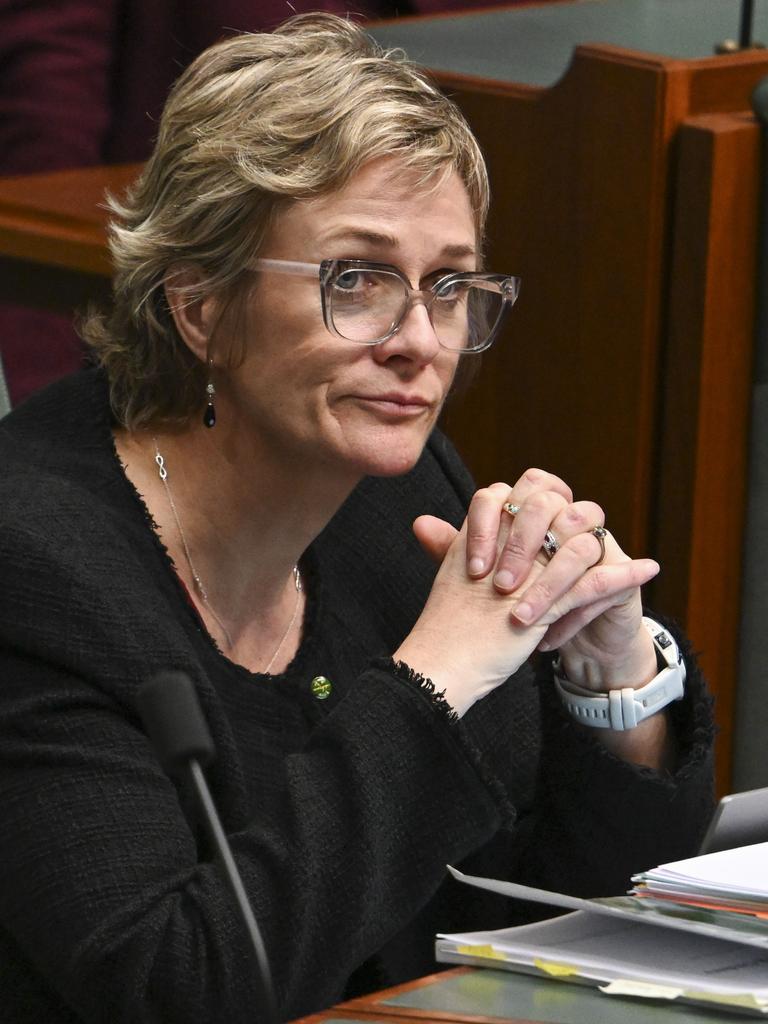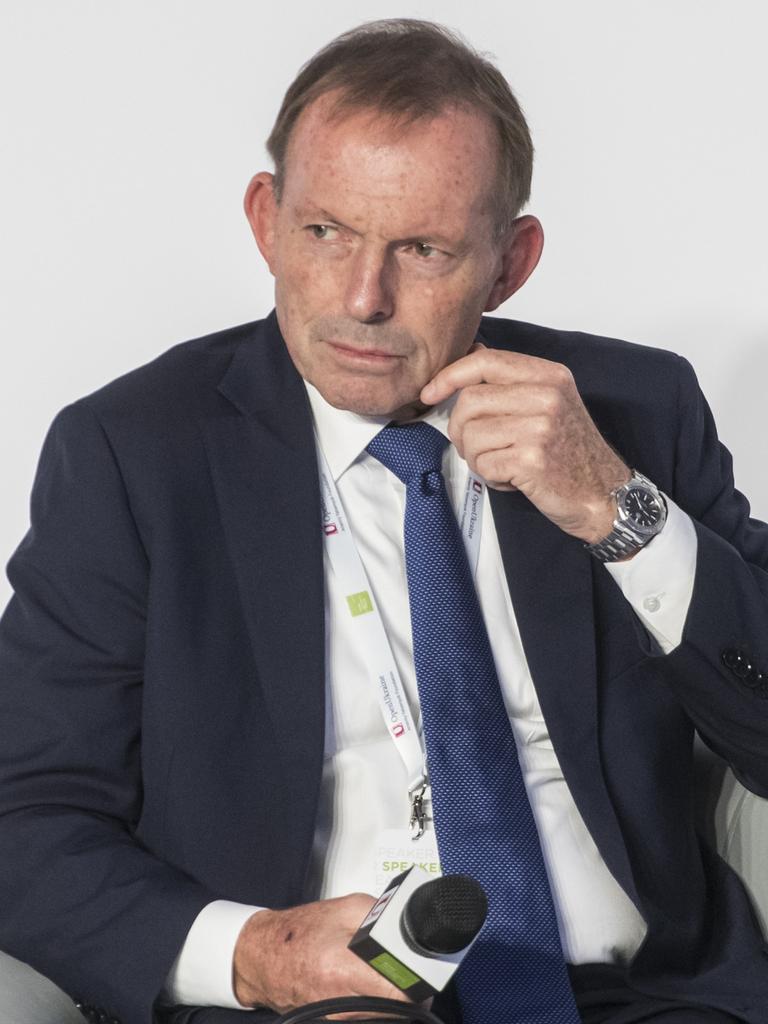Divisiveness and dishonesty will unseat the teals
Zali Steggall, Peter Dutton, Allegra Spender, Tony Abbott, Simon Holmes a Court.The Coalition’s cost-of-living pitch to win seats off Labor, it is thought, will not go over well in the teal seats, where well-to-do voters can afford to maintain luxury beliefs such as putting emissions reduction ahead of reducing power bills.
But this misunderstands what actually happened in 2022. The Liberals did not lose the teal seats because very large numbers of Liberal voters have permanently abandoned their longstanding preference for the party of freedom and free enterprise in favour of virtual Greens.
What the ANU’s Australian Electoral Study shows, in the most well-respected and in-depth analysis of the 2022 federal election result, is that only one in five people who voted teal had voted Liberal at the previous election; meaning four out of five did not. These weren’t disaffected Liberals – they were never Liberals in the first place. What helped them win was a sophisticated psephological strategy that depended on Labor running dead in seats with strong “independent” candidates, who then harvested Greens and Labor preferences, plus the votes of a much smaller number of discontented Liberals, to get ahead of the sitting Liberal MP.
Peter Dutton.The question, then, is what factors were at work to depress the Liberal vote back then; and are they likely to be replicated next year?
In 2022, the Coalition had been in office for nine years, had emulated Labor’s political cannibalism with a revolving door prime ministership, had dismayed traditional Liberals by massive spending and unprecedented restrictions on daily life in an over-reaction to the Covid pandemic, and had generally conducted themselves as a Labor-lite government, at least after Tony Abbott was deposed as leader.
As well, the voters who had been prepared to give Scott Morrison the benefit of the doubt in 2019, when Labor was promising extra taxes on investors and retirees, had a very different view after three years of his prime ministership and Labor was pretending to be a safe change.
While it’s true that there has been a long-term tendency, across the Anglosphere, for richer and more educated people to vote more to the left, and for poorer people to vote more to the right, a key factor in the teals’ favour was Morrison’s personal unpopularity and the fact that voting teal was a way to punish a disappointing government without actually voting Labor.
If only half of the 2022 Liberal defectors were long-term political emigrants to the left, as opposed to one-off malcontents who could come back, given that most of the teal seats are held with margins of under 5 per cent, there’s every reason to think that some will indeed return, at least with the right candidates. These are unlikely to be hardline conservatives or factional time-servers, but could be the kind of centre-right high achiever who used to abound in Liberal preselections before the party became so factionalised.
Simon Holmes a Court.After all, if better-off voters want to register their disapproval of a government that pretended to be in the tradition of Bob Hawke but has governed more in the style of Gough Whitlam – by giving in to unions, breaking promises on tax cuts, weakening national security, and running an out-of-control immigration program, including gifting visas to people from Gaza without any serious security checks – they can’t do so by voting teal. If anything, in the event of a hung parliament, teal candidates will almost certainly line up behind the green-left Albanese government. So, the only way to register a protest against a bad Labor government is to vote Liberal, not teal.
In 2022, the teals’ pitch to previously Liberal voters was that they were the candidates that the Liberals should have had, were it not for the malign influence of vested interests, factions, and politics as usual.
In fairness to the candidates whom Simon Holmes a Court and his Climate 200 cohorts were politically savvy enough to endorse, they all had strong CVs, and looked reasonably representative of the progressive professionals who disproportionately live in up-market seats; without seeming like climate fanatics. But that’s not how they’ve turned out. In fact, based on their voting records, and on their public demands, they’ve been far more left-wing than Labor.
Based on public data produced by the Parliamentary Library, the teals’ closest political collaborators are not the Labor Party (they’ve voted with Labor about 70 per cent of the time on substantive matters before the parliament) but the Greens. On substantive bills before the parliament, they’ve voted with the Greens almost 80 per cent of the time.
Zali Steggall.What’s more, the teals’ most recent major public statement has been to attack the Albanese government for reneging on its commitment to declare a 2035 emissions-reduction target pre-election; and also to demand that the government commit to a full 75 per cent target in just over a decade. Sure, especially in teal seats, quite a few Liberal voters think that climate change is a key issue. But are they really going to stick with teal MPs who want to go further than Labor, especially given that Dutton is committed to net zero by 2050 and has a credible plan to get there, while keeping the lights on, by using nuclear power?
Now that they’ve been in the public eye for some time, the teals’ real political orientation is much clearer. It’s not just that they want stronger action on climate change than that proposed by the Morrison government; they also want stronger action than that proposed by the Albanese government, as well. Reading their parliamentary maiden speeches, for instance, they weren’t just supporters of the Indigenous voice but enthusiastic and passionate backers of the full Uluru – Voice, Treaty, Truth – agenda; and their enthusiasm for Indigenous separatism and their belief that Australian society is deeply flawed doesn’t seem to have been reconsidered in the light of the voice’s overwhelming defeat.
Tony Abbott.On this issue, too, they don’t just want stronger action than that proposed by the Morrison government but stronger action than that now proposed by the Albanese one.
Then there’s the shop-soil factor that afflicts all MPs, especially those who enter the parliament claiming to be morally better than everyone else. For someone accustomed to decry bad behaviour in the parliament, Zali Steggall’s recent slur, that Peter Dutton was somehow being “racist”, was especially unworthy. So, too, the continued claims of a “misogynistic” parliament. Sorry, girls, parliament is adversarial and that’s not the same thing. The battle of ideas is fundamental to our democracy, and to try to shame MPs into some sort of forced consensus because you don’t like having to argue your case or defend positions only underscores a lack of values and conviction.
My instinct is that, in the longer run, voters prefer politicians who are honest about where they stand and who are clearly different from their competitors. Labor-lite Liberals generally end up alienating traditional Liberal voters without winning over Labor ones. After all, voters normally prefer the genuine article to pretenders trying to be all things to everyone.
- Forums
- Political Debate
- It ain’t easy being Green
Divisiveness and dishonesty will unseat the tealsZali Steggall,...
-
- There are more pages in this discussion • 12 more messages in this thread...
You’re viewing a single post only. To view the entire thread just sign in or Join Now (FREE)















The conventional wisdom, that Peter Dutton can’t win next year’s election in his own right, assumes it’s impossible for the Opposition Leader both to win sufficient aspirational seats off Labor and to regain the seven formerly Liberal seats lost to the teals.